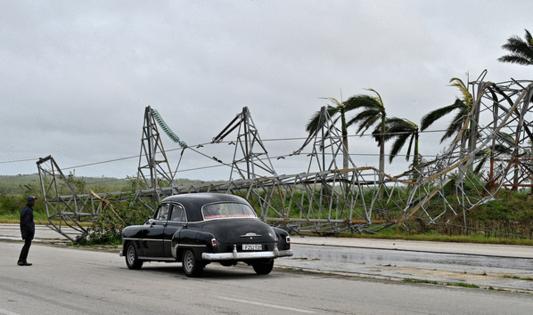Hurricane Rafael left trail of collapsed homes, lost crops and damaged infrastructure in Cuba
Published in Weather News
Hurricane Rafael left a trail of collapsed homes and buildings and damaged schools, hospitals, electrical and telecommunications infrastructure as well as crops in Havana and other provinces in western Cuba, aggravating the crisis already engulfing the impoverished island.
The hurricane, which pounded the Cuban capital and the provinces of Artemisa, Mayabeque and Pinar del Río with Category 3 winds on Wednesday, knocked out the island’s electrical grid. Most of western Cuba has no power, and in Havana only 17% of clients had service on Friday afternoon.
The hurricane also caused 471 homes and buildings, already in poor condition, to collapse in Havana partially or totally, according to a preliminary assessment shared by the Havana province governor, Yanet Hernández Pérez. She said 496 utility poles and over 100 transformers were down, further complicating restoring power.
In Artemisa, the hardest hit province, Rafael damaged 2,825 homes, hospitals and schools, 174 government stores and the province’s baseball stadium, according to preliminary reports.
Communications were also severely damaged.
The first vice-minister of communications, Wilfredo González Vidal, said that 77% of cell clients in Havana, Artemisa and Mayabeque had no phone service. Etecsa, the state telecommunications company, said Thursday that the hurricane disrupted the service to 60% of its clients. Over 53,000 phone landlines are also out of service in those three provinces.
Netblocks and the Internet Outage Detection & Analysis project, two groups monitoring internet traffic, reported outages in Cuba around the time the grid collapsed on Wednesday.
Rafael’s damages add to an already dire situation. The country was hit by another hurricane, Oscar, last month that left eight people dead and devastation in the eastern province of Guantánamo.
Just days before Hurricane Oscar hit the island, the country’s ancient electrical grid collapsed following a failure in a major power plant. It took the government several days to restore power. Ahead of the collapse, Cuban authorities had declared an energy emergency because the blackouts were paralyzing the economy.
When Rafael hit, many Cubans were already in the dark, with no electricity and facing shortages of food and medicines, disruptions in water service and garbage pick-up because the government, as many economists have bluntly put it, is bankrupt.
“There is no food here, no electricity, no liquefied gas, there is nothing here, this is a disaster,” lamented a resident of Centro Havana, who asked not to be named. “I’m thankful that at least I have family in the United States that sends me food.”
María Elena González, another Centro Havana resident, said that she and other neighbors were able to recharge her phone’s batteries at a private business with a generator. She said she had been without electricity since Wednesday morning before Hurricane Rafael made landfall in Artemisa around 4 p.m.
A resident in the town of Regla, who also asked not to be identified, said the lights went out Wednesday.
“I’m still without electricity,” she said Friday morning, “afraid that our food will spoil without the state giving us anything to eat, without even a cracker. We are more or less trying to preserve the little food that we were able to buy, but everything is super difficult.”
Two hurricanes in a month, plus the lack of electrical service and oil, will worsen what experts call “food insecurity,” or the lack of available food on the island. The government’s disastrous agricultural policies, premised on price caps and a centralized distribution system that forces producers to sell most of their crops to the government at below-market prices, have caused food production to plummet on the island.
Crops in Artemisa, a significant supplier of fresh produce to the capital, were badly damaged.
More than 22,000 acres of banana trees, 9390 of yuca, 2572 of vegetables, 1729 of beans, 1235 of rice, 1331 of corn, 882 of coffee and 143 of soy were lost or suffered damages, the local newspaper El Artemiseño reported.
Oscar Pérez-Oliva Fraga, the minister of foreign trade and investment, acknowledged that the government depended on foreign aid to help the victims of the two hurricanes.
“The existence of resources provided by the United Nations allowed us to provide an immediate response to assist the victims with food products and other necessary supplies,” he said in a press conference on Thursday.
He said that Mexico, Colombia, Bolivia, Venezuela, Russia and China have also helped “in the recovery of the National Electrical System and with supplies, medicines and construction materials.”
_______
(El Nuevo Herald reporter Maykel González contributed to this story.)
_______
©2024 Miami Herald. Visit miamiherald.com. Distributed by Tribune Content Agency, LLC.







Comments